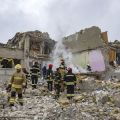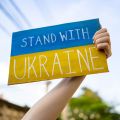
Expert Comment: Reflecting on the third anniversary of Russia's invasion of Ukraine
Dr Marnie Howlett, Departmental Lecturer in Russian and East European Politics in the Department of Politics and International Relations and the Oxford School of Global and Area Studies, reflects on the third anniversary of Russia’s invasion of Ukraine.
Three years ago, on 24 February 2022, Russia illegally invaded Ukraine. While Ukraine was largely ignored in international discourses and policy debates prior to late 2021, it was a sovereign state at the time of Russia’s invasion, as it has been since 1991 and remains today. Like all fifteen of the former republics of the Soviet Union, Ukraine became independent with the Union’s collapse in the early 1990s. For Ukraine, and thirteen of the other once-Soviet republics, this not only represented sovereignty in a territorial sense, but freedom from Russian control.
While this shared Soviet history prompted much scepticism globally in late 2021 and early 2022 about the fact that Russia – a permanent member of the United Nations’ Security Council – would consider invading (let alone actually invade) its neighbour, its leaders had previously shown their blatant disregard for international law. This was seen when Russia invaded Georgia in 2008.
The 2022 invasion was also not the state’s first attack on and violation of Ukraine’s sovereignty: it initially invaded Ukraine in 2014, eight years prior. By illegally annexing the Crimean Peninsula and occupying much of Ukraine’s Donetsk and Luhansk regions, the Russian Federation started its war against Ukraine – a conflict that continues today, more than eleven years later. Russia’s full-scale invasion three years ago was thus just one more example of how the state seeks to (re)affirm its dominance in the former Soviet space and keep certain states (and not only Ukraine and Georgia) within what it considers its sphere of influence.
In a world of increasing democratic-backsliding, and where authoritarian regimes invade sovereign states, Ukrainians’ ongoing commitment to their state shows that democratic values are worth safeguarding. As the Ukrainian population has vividly demonstrated these last three years: they are also worth fighting for, at any cost.
Dr Marnie Howlett, Departmental Lecturer in Russian and East European Politics in the Department of Politics and IR and the Oxford School of Global and Area Studies
But beyond exposing Russia’s geopolitical ambitions, its 2022 invasion of Ukraine has also revealed other critical insights about politics in the region.
Most evident is that former Soviet states like Ukraine do not see their futures tied to that of Russia or dictated by Russia’s great power demands. Ukrainians’ determination to categorically defend their political autonomy and territorial integrity over the last three years despite immense material and territorial losses and Russia’s ongoing hybrid war, employing both conventional and psychological warfare tactics, demonstrates a strong opposition to their eastern neighbour and its influence in their domestic affairs. Even more, it exhibits the strength of Ukrainian civil society and the significance citizens place on their democracy, freedom, and independence.
Whilst falsehoods proliferated by global political leaders have sought to blame Ukraine for Russia’s aggression against it, using a victim blaming logic of sorts, Ukrainians’ resilience and grit over the last three years also remind us of the value and vulnerability of democracy.
Amidst daily deadly attacks by Russia, the Ukrainian population has, and continues, to fight for the principles inherent to liberal democracies, especially the freedom of expression, rule of law, and protection of human rights and civil liberties. Although Ukraine’s ability to hold free and fair elections has been temporarily suspended under martial law – even if it were logistically possible during war given the significant number of Ukrainians living under Russian occupation, serving in the military, and displaced in Ukraine and abroad – President Zelensky still maintains a high level of trust within Ukrainian society, with estimates around 60 percent of popular support. He remains a legitimate, democratically elected leader within the war-affected country, despite suggestions to the contrary.
In a world of increasing democratic-backsliding, and where authoritarian regimes invade sovereign states, Ukrainians’ ongoing commitment to their state shows that democratic values are worth safeguarding. As the Ukrainian population has vividly demonstrated these last three years: they are also worth fighting for, at any cost.
This is underscored by the fact that Ukrainians continue their fight despite the immeasurable devastation caused by Russia’s eleven-year war on their country. While the precise number of casualties since 2014 are not shared publicly, estimates suggest that more than 46,000 Ukrainian military personnel have been killed and around 400,000 injured since February 2022 alone. In excess of 40,000 civilian casualties have also been documented by the Office of the United Nations High Commissioner for Human Rights.
Indeed, these numbers fail to include the lives lost due to secondary impacts of the war, such as limited access to health care and other social services or forced displacement. Crucially, these statistics not only represent lives unnecessarily taken too soon, but families and larger communities scarred and forever changed by the war.
Against the backdrop of the tense geopolitical environment we are currently living within, the third anniversary of Russia’s full-scale invasion of Ukraine is therefore an important moment not only to reflect on the last three but the last eleven years of the Russia-Ukraine war.
It is even more vital to remember the people who have been most directly affected by the conflict: Ukrainians. Their views must fundamentally be accounted for in any discussions and eventual negotiations about ending the war to ensure a just and sustainable peace – and not merely the absence of fighting – and the future of sovereign Ukraine.
 Expert Comment: Chatbot-driven sexual abuse? The Grok case is just the tip of the iceberg
Expert Comment: Chatbot-driven sexual abuse? The Grok case is just the tip of the iceberg
 New study finds that stopping weight-loss drugs is linked to faster regain than ending diet programmes
New study finds that stopping weight-loss drugs is linked to faster regain than ending diet programmes
 Expert Comment. Ukraine war: Putin’s masterclass in delusion, denial and defeat
Expert Comment. Ukraine war: Putin’s masterclass in delusion, denial and defeat
 Expert Comment: 24 months and 8 years later, Ukraine’s war for independence continues
Expert Comment: 24 months and 8 years later, Ukraine’s war for independence continues
 Expert Comment: Russia’s invasion of Ukraine and European public opinion
Expert Comment: Russia’s invasion of Ukraine and European public opinion